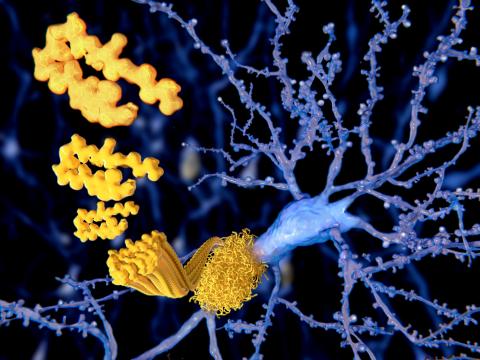Association found between the use of drugs such as vaccines, antibiotics or anti-inflammatory drugs and lower risk of dementia
A review of 14 studies and data from more than 130 million patients has found an association between the use of drugs such as anti-inflammatory drugs, antibiotics and vaccines and a reduced risk of dementia. The authors recall that “the fact that a particular drug is associated with an altered risk of dementia does not necessarily mean that it causes or helps against it.” However, “pooling these huge health data sets provides a source of evidence that can help us decide which drugs to try first.” The research is published in the journal Alzheimer's and Dementia: Translational Research & Clinical Interventions.

Eloy - Fármacos (EN)
Eloy Rodríguez Rodríguez
Head of the Neurology Department at the Marqués de Valdecilla-IDIVAL University Hospital and Associate Professor of Medicine in the Department of Medicine and Psychiatry at the University of Cantabria
This is a systematic review of epidemiological studies that study the association between different drugs and the risk of dementia. Methodologically it seems to be well conducted, and the team is made up of high-level experts in this field.
The main conclusions of the study are that, putting together all the data from the studies analyzed, there are several groups of drugs (antimicrobials, vaccines and anti-inflammatory drugs) that are associated with a lower risk of dementia. These studies are interesting as hypothesis generators, but conclusions should not be drawn from them, because the data, in general, are of low quality (taken from large registries, with very limited clinical information, and not always available) and are subject to finding erroneous relationships (for example, you can associate the use of antidepressants with dementia, but it is really the early stages of dementia that cause more antidepressants to be prescribed; or treatments for cerebrovascular events, when it is the stroke that predisposes to dementia). These points are correctly analyzed in the discussion.
The issue of anti-inflammatory drugs is not new; in fact, there have been directed clinical studies in Alzheimer's disease with some NSAIDs [non-steroidal anti-inflammatory drugs], but without results in the search for a direct relationship. The subject of antimicrobials and vaccines is interesting, since there has been talk for some time about the possible relationship of certain infections, mainly viral, with the etiology of Alzheimer's disease, and the possible protective action of some vaccines by 'training' our brain immune system, either to better fight against these harmful infectious events, or to have a more adequate immune response to other events that may influence the risk of developing the disease.
In short, for me, no significant conclusions of causal/protective relationships can be drawn, but it is interesting to keep the research focus (or increase it) on the role of viral infections and the regulation of immunity/inflammation as factors involved in the origin of Alzheimer's disease and other neurodegenerative diseases.
Kevin - Fármacos
Kevin McConway
Emeritus Professor of Applied Statistics, Open University
This is an interesting study, and some of its findings could well be of importance in the future. However, the findings cannot lead directly to treatments for dementia. They might point the way to further research on some existing drugs, than in turn might possibly lead to some treatments. But that would require considerably more research, over quite a long time period.
The top line of the press release, and its first paragraph, might be taken to mean that all or most existing drugs in the classes that are named (antibiotics, vaccinations and anti-inflammatory medicines) were found to be linked to reduced dementia risk. But that’s certainly not what the study found. It found evidence of a link for only a few drugs in each of the categories. For instance, out of all vaccines, only four are specifically named in the paper as being linked to reduced dementia risk (hepatitis A, typhoid, a combined vaccine for both hepatitis A and typhoid, and diphtheria).
It makes good sense to look for existing medications for other health conditions that might affect dementia risk. That approach had some successes in treating Covid, for instance. A lot will already be known about the safety and possible side effects of existing medications, from clinical trials of those drugs and surveillance of their routine use. That could shorten the time to starting to use one of those medications for dementia, because the amount of time and expense for safety testing could possibly be reduced. Also, many existing medications would already have been in use long enough for their patents to expire, so that they are likely to be relatively cheap to produce and procure.
There have already been some studies of using existing medications for dementia, so it makes sense to review studies systematically. However, this new systematic review takes a particular approach that is perhaps unusual. It reviews only previous studies that looked at a very wide range of existing medications, in relation to dementia risk. Those studies often took data from electronic health records, and examined which medications had been prescribed for a wide population of people in some defined region of the world.
Studies like that generally use very large data sets, since they involve large numbers of people and large numbers of medications. So they often use rather sophisticated statistical methods, for example from machine learning, to analyse the data. And different studies use different statistical methods. That can make it very difficult to compare what different studies found.
Often in a systematic review, the researchers will use a particular statistical approach, called meta-analysis, to produce a pooled estimate of (for example) the strength of association between taking a particular medication and some health outcome of interest. But (despite the mention of pooling studies in the press release) the researchers here took the decision not to use a formal pooling method of any sort. That’s because the studies that they reviewed were so diverse in their statistical methods, and indeed in their overall approach.
I think it is the right decision not to pool formally. But it means that it’s completely impossible for the researchers to give a pooled measure of the strength of any of the associations that they discuss. So they can say (for an example) that there seems to be an association between some antibiotics and reduced risk of dementia, but they can’t give any estimate for how much lower dementia risk seems to be in people that take a certain amount of a certain antibiotic, compared to people who do not take it. That’s one of the reasons why this research isn’t anywhere near proposing any treatments for dementia.
Because there’s no formal pooling, the researchers use (in some places) what’s known as a ‘vote-counting’ approach, of seeing and reporting how many studies found evidence of a particular link between a medication or class of medications and dementia risk. But vote-counting approaches are notorious for being potentially very misleading. That’s because they do not generally take account of the differing strength of evidence from different studies that are being reviewed.
In this review, the studies being reviewed not only used different statistical methods, but they had very different aims. Half of them (7 out of 14) were specifically looking for associations between existing medications and dementia risk. But the other half were not. Instead they were looking for combinations of many factors, including drug prescriptions but also many other things like patient characteristics and histories, that could produce a good predictor of dementia risk.
In predictive studies like that, a factor that is strongly linked with dementia could be left out of the statistical model, simply because of the way it is related to other factors in the model. So these predictive models would have a different basis for identifying links between medications and dementia risk than would the other studies that were directly looking at medication links to dementia risk. Therefore just counting which drug classes appeared in how many of the overall 14 studies could give a misleading impression. (The researchers seem not to have fallen into that trap entirely, but it does add yet more complication.)
One more reason that these findings are not close to leading to dementia treatments is that the associations that are described between medications and dementia risk are not necessarily describing cause and effect. The studies that are being reviewed were not necessarily looking for causes and effects. The researchers on this new review emphasise this very strongly. A medication might show up as associated with reduced dementia risk, but that does not mean that the medication causes the reduced risk.
For instance, the condition that led to the medication being prescribed might actually be the cause of the change in risk. Or, as the researchers mention, there’s the possibility of reverse causation, where the early stages of dementia or cognitive decline, or some health condition that increases dementia risk, might cause a particular treatment to be prescribed. Some of the individual studies that were reviewed would have taken care to try to allow for these issues of cause and effect, but in very wide observational studies of the type that were reviewed, it’s impossible to do that perfectly, and in any case it can’t be considered in detail in a review of this nature.
So, in summary, we have a review that suggests some classes of drugs that might well be worth investigating further, to learn more about whether and how they are associated with dementia risk. It doesn’t, indeed it can’t, go further than that. And it reports mainly on wide classes of medications rather than specific drugs, because the researchers found only very few specific medications that were reported as being associated with dementia risk in more than one of the studies they reviewed. They found only nine specific medications, out of the thousands included in the studies they reviewed, that had evidence of an association with dementia risk from two studies (and none with evidence from more than two studies).
Underwood et al.
- Research article
- Peer reviewed
- Observational study
- People
- Systematic review



